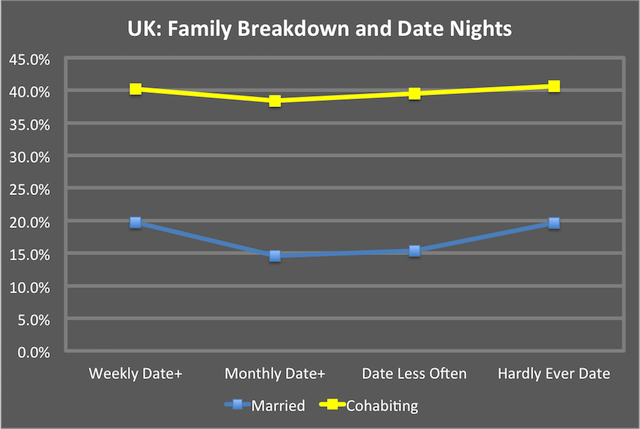Highlights
Many long-time married couples swear by the idea of a regular “date night” to keep their relationship on track.
Relationship commentators and marriage educators agree. Google the words “date night,” and any number of articles pop up exhorting couples to get out and spend time on their relationship. The reasonable assumption is that time out together as a couple is romantic, giving couples an opportunity to talk—away from the constraints of children and home—while also demonstrating commitment and intent in making their relationship a top priority.
But do date nights really make a difference? Do couples who go out on regular date nights do better than those who don’t?
With the help of Professor Steve McKay of the University of Lincoln, the Marriage Foundation used data from one of Britain’s biggest household surveys to answer that exact question. Our new report is here.
Based on the Millennium Cohort Study of 10,000 mothers in the UK who were either married or cohabiting as a couple when their child was nine months old, we looked at how often these couples went out together at that time, and compared it to whether they were still together as a couple just over 10 years later.
Now, all sorts of things are already known to influence the chances of staying together. So first, we needed to isolate each of these factors. As expected, being older, having a degree, being married, and having a stronger relationship all made a big difference in whether couples were still together 10 years later.
But even after removing the effects of all of these factors, and therefore comparing like with like, we found that couples who went on monthly date nights together were still slightly more likely to stay together than those who hardly ever went out. Going out weekly didn’t seem to make any difference at all. Overall, the odds of splitting up among couples who went out monthly or less often were 14 percent lower over the next 10 years compared to couples who went out either weekly or rarely.
When we looked into this a bit further, to our surprise, we found that this monthly date night effect only applied to married couples. Cohabiting couples who went out on a date did no better than those who didn’t.

Why do married couples seem to benefit from the occasional date night out whereas cohabiting couples don’t?
Perhaps it boils down to the original assumption behind date nights. By going out every so often, married couples reinforce the importance of their relationship. Because their relationship is founded on a clear, public act of commitment, a night out together makes a statement about the nature of the relationship. In other words, the date has a meaning and a purpose.
For couples who are not married, however, it’s a lot more likely that there would be some unspoken element of ambiguity about their future together. Many or most unmarried cohabiting couples will never have that moment where both partners have made it crystal clear that the plan is to stick together for life. In that case, a night out would simply be a night out.
Do date nights work for married couples with older children, or even those without children? Our study did not look at that specific question, so we don’t know. But what our new findings are clear about is that occasional date nights bring added stability to the relationship between new parents. It seems plausible that the same thing can happen at any stage of marriage because what date nights really do is reinforce existing levels of commitment.
So what have you got to lose? Book that restaurant now!












